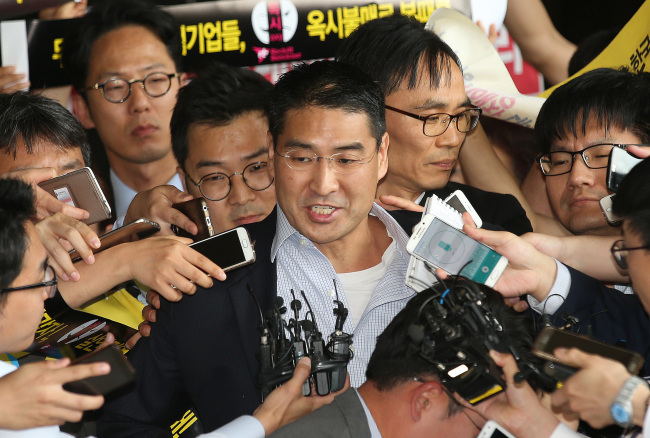The prosecution on Monday questioned former Oxy Reckitt Benckiser CEO John Lee on charges of accidental manslaughter and injury as part of the widening probe into the humidifier disinfectant scandal.
Lee, a 48-year-old Korean-American who currently heads Google Korea, is suspected of not taking appropriate measures despite rising health complaints from users when he was leading the company from June 2005 to May 2010. Sales of Oxy Ssak Ssak reached a high during his term.
 |
Former CEO of Oxy Reckitt Benckiser John Lee (center) appears for questioning at the Seoul Central District Prosecutors’ Office on Monday. Yonhap |
“(The case) is very heartbreaking,” Lee said in Korean as he appeared at the Seoul Central District Prosecutors’ Office. “My prayers and condolences go out to the victims and the families. I will cooperate with the investigation,” he added in English.
Lee is the first foreign national to be questioned as a suspect in the sterilizer case that has resulted in at least 146 deaths recognized by the government. Last week, prosecutors questioned Ulrich Hosterbach, a finance director of Oxy – currently Reckitt Benckiser Korea – as a witness.
The prosecution questioned Lee on whether he had known about the harmfulness of the product and the reasons for failing to take measures despite the health complaints. They also looked into what and how much of a role the U.K. headquarters played in decision-making over the product. The U.K. headquarters owns 100 percent of the Korean subsidiary.
The investigators said they will decide on the charges against Lee based on the evidence and questioning.
The prosecution also called in two officials each from Lotte Mart and Homeplus, who were in charge of developing their own humidifier disinfectant brands.
Meanwhile, a group of victims and their families filed complaints with the prosecutors against 18 public officials for accidental manslaughter for neglecting their duties to ensure product safety. The accused include two former environment ministers -- Kim Myung-ja who served from 1999 to 2003 and Kang Hyun-wook who served from 1996 to 1997 -- and other Environment Ministry officials.
They were in charge of the country’s chemical safety rules and giving permits to manufacturers for the use of PGH and PHMG, which were used in the toxic humidifier disinfectants.
“(The accused) allowed the use of the toxic chemical without fully reviewing the toxicity according to the regulations. Even after the toxicity was confirmed, the (ministry) neglected the disinfectant users, leading to more deaths and injury,” said attorney Ha Joo-hee, who works as one of legal representatives for the group.
“They violated their duties, not only morally but also legally. For the disinfectant toxicity review, the ministry did not receive any data about the inhalation-toxicity test, although the ministry was supposed to do so.”
Under the rule, the general use and specific use of chemicals should be submitted to the ministry for toxicity review. For chemicals used in products related to inhalation, companies must submit additional safety test data.
PHMG was first developed by a local company in 1996 and registered as an antimicrobial agent for carpets. In the U.S., the chemical has been classified as an agricultural pesticide.
The victims argued that the ministry did not thoroughly review the chemicals’ toxicity and did not ask the company for a inhalation-toxicity test, however, the ministry has claimed that reviewing the chemical's inhalation toxicity was not necessary as the harmfulness of PHMG was low as long as it is used as a carpet treatment.
PHG was also registered as an antimicrobial treatment for rubber, woods and fabrics, based on which it did not require an inhalation-toxicity test.
The ministry did not comment on the complaint filed by the victims.
By Lee Hyun-jeong (
rene@heraldcorp.com)








![[Today’s K-pop] Blackpink’s Jennie, Lisa invited to Coachella as solo acts](http://res.heraldm.com/phpwas/restmb_idxmake.php?idx=644&simg=/content/image/2024/11/21/20241121050099_0.jpg)